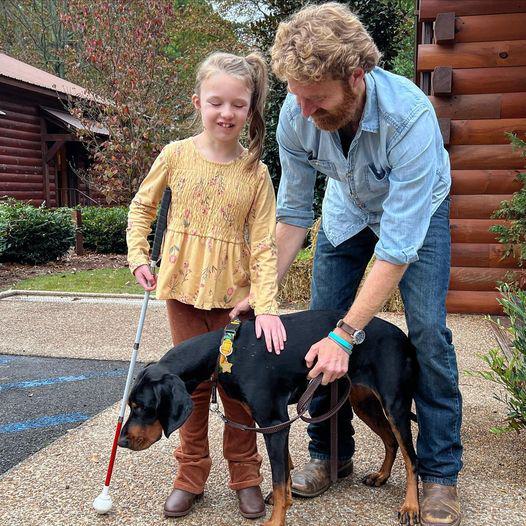Becca is 10 years old. She waits for me patiently outside the restaurant because—big surprise—I am late for our meeting. I will be late for my own cremation.
Becca’s hair is pulled into a side ponytail. She is wearing corduroy pants, floral top, and roper boots. The girl sits waiting, grasping her guide cane. Her eyelids are closed. She is smiling. Becca, I will soon learn, always smiles.
Becca’s mother makes our formal introductions. The little girl presents her hand. We shake.
“Nice to meet you,” she says, pumping my hand in her tiny grip.
“Nice to meet you,” I say.
The restaurant is alive with sounds. The place is packed. Everyone in Sardis City must be eating at Bama Bucks steakhouse and wild game restaurant today.
Becca and I sit across from each other. Becca’s mom sits beside her and reads the menu aloud, but Becca already knows what she wants. Chicken tenders. French fries. Side of ranch.
Our server delivers hot dinner rolls. Becca’s mom guides Becca’s hands to the bread basket. And Becca is still smiling as we get to know each other.
There’s a scar underneath Becca’s jawline, from where doctors recently removed her lymph nodes.
“How are you feeling since your surgery, Becca?” I ask.
“Oh, I feel really good,” Becca says.
“Has your energy come back?”
Becca’s dad answers this one. “Becca has a lot of energy."
Becca has been blind for one year now. It’s still new. But somehow, the smile never goes anywhere.
“When I first woke up,” Becca says, “after they took out my eye, I could feel the patch on my face, and I knew what they’d done to me. It was pretty obvious. My eye was gone. I was so scared, I started screaming, ‘Mom, I can’t see! I can’t see!’ But then after I got scared, you know, I was okay.”
Becca explains all this to me as she cheerfully eats a dinner roll.
“On the way home from the hospital,” says Becca’s mother, “I was crying silently so Becca wouldn’t hear me cry. And while I was crying, I heard singing coming from the backseat. It was Becca, she was smiling and singing along with the radio even though she had just lost her vision.”
Since going blind, Becca has kept busy. She has taken up the harp, cigar-box guitar, learned braille, written poetry, received a prominent role in the school play, and is planning on becoming a meteorologist.
“Actually,” says Becca, “being blind isn’t so bad. There’s been so much good stuff that has come out of my being blind.”
“What kind of stuff?” I ask.
“More people are learning about God because of me. And that’s good.”
Still smiling.
Our food arrives. Becca’s dad asks her to say the blessing. So we all fold our hands. Becca speaks softly. The cadence of her words, the timbre of her voice, is a work no composer could duplicate. It is the sound of God’s music.
“Amen,” everyone says. Whereupon Becca drowns her fries in ranch.
After we eat, it’s time for the main event. Becca is introduced to my blind coonhound Marigold.
Marigold has been blind for a few months now. She lost her eye because her previous owner took a blunt object to her head. Doctors removed Marigold’s eye. When Marigold first woke up without her vision, she was terrified. She screamed in her kennel for days.
“I know how she feels,” says Becca.
Becca places both tiny hands on Marigold’s wounded face. “She’s so pretty,” says Becca. “So very, very pretty.”
Still smiling.
Marigold leans into Becca, and the girl begins to laugh. It is an infectious laugh.
“It’s like Marigold is hugging me,” says Becca.
Becca and I talk more, we laugh some, we hang out. I wish I could tell you everything about her, but I don’t have enough room.
What I can tell you is that her family is beautiful. Her father, her mother, her older brother. These are the kind of people I want to be someday.
It takes us all about 30 minutes to say goodbye, because that’s just how people are in our part of the world. We do not offer quick farewells. Goodbyes in Alabama can last for three, sometimes four presidential administrations.
When we’re finished Becca gives me a hug. Then she gives Marigold a final farewell by hugging her with both arms. My cup runneth over. Becca smiles and speaks to the whole group.
“We really should do this again sometime,” she says.
Yes, Becca, we really should.
Sean Dietrich is a columnist and novelist known for his commentary on life in the American South. He has authored nine books and is the creator of the “Sean of the South” blog and podcast. The views and opinions expressed here are those of the author and do not necessarily reflect the policy or position of 1819 News. To comment, please send an email with your name and contact information to Commentary@1819News.com.
Don’t miss out! Subscribe to our newsletter and get our top stories every weekday morning.










